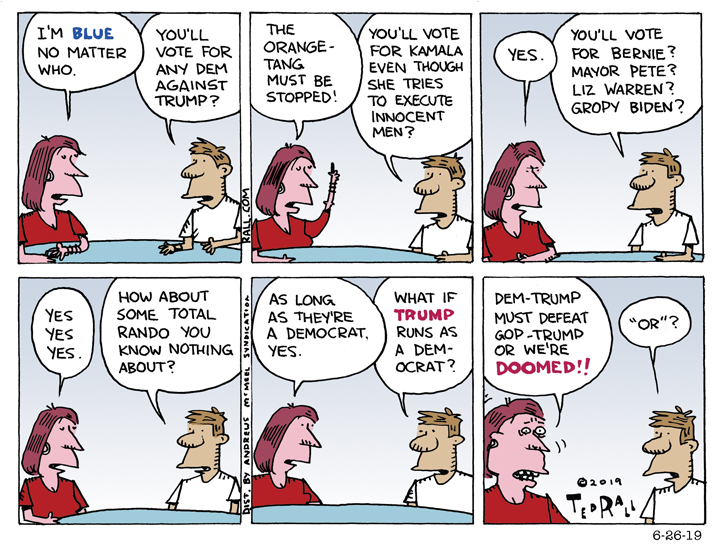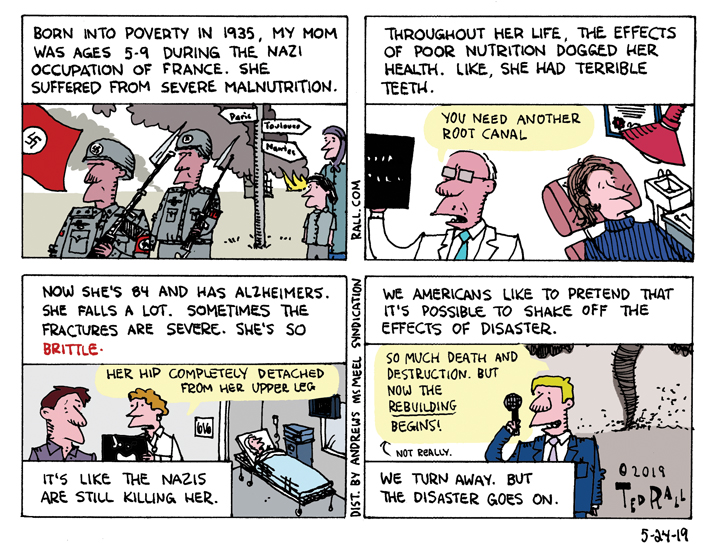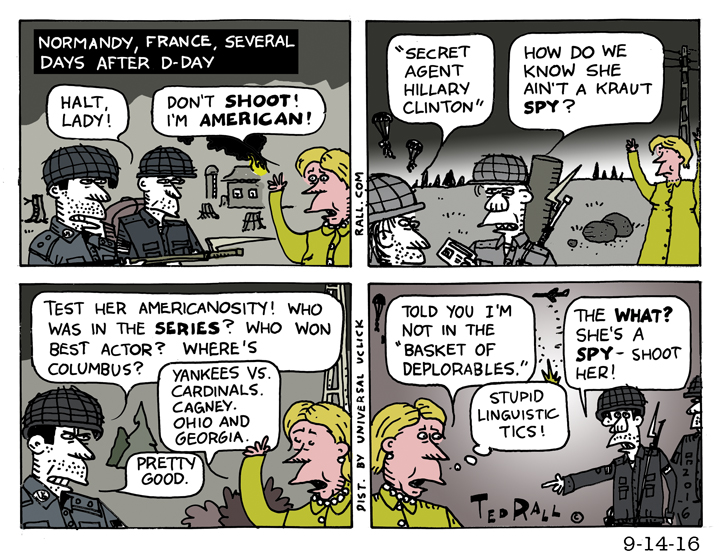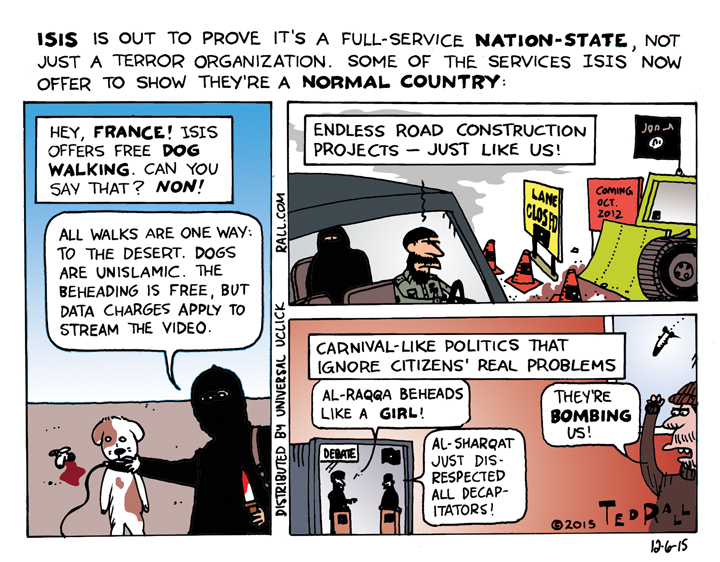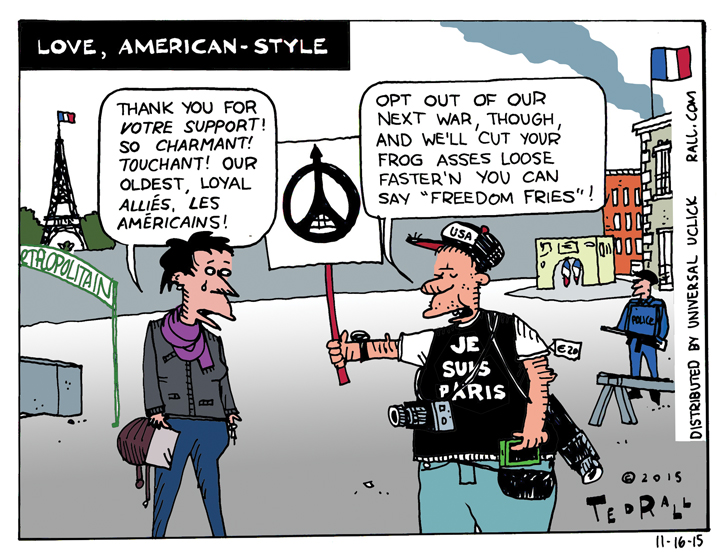Some Democrats say that they are “blue no matter who.” Trump, they say, is such an existential threat that they will vote for anyone who winds up as the Democratic nominee for president. But is it really wise to extend such a blank check to a party that has disappointed us so many times before?
Broke? Declare Yourself a Church and Burn
After a devastating fire laid waste to much of the Cathedral of Notre Dame in Paris, three spectacularly wealthy French industrial families pledged 700 million euros to re-build the iconic structure. It was a generous gesture. But it was disconcerting that purse strings would open so quickly to repair a damaged building while so many actual living breathing human beings in France were suffering that the so-called “yellow vest movement” was rioting in the streets of Paris just a few weeks earlier.
Liberals Used to Feel Your Pain. Now They Inflict It.

Liberals are supposed to feel other people’s pain. Now they seem more intent on inflicting it.
I noticed the de-empathification of the Democratic Party during the implementation of Obamacare. I lived in one of many counties with zero or one plan on offer. Low supply and high demand—hell, the ACA required you to buy one or get fined—allowed insurers to gouge patients with sky-high rates. The one plan in my county’s ACA sucked. It charged a $1400-per-month premium with a $10,000-a-year deductible—and featured no doctors within network within a 90-minute drive.
On Facebook I complained about the paucity of affordable plans in my online health insurance marketplace. “I don’t know what you’re going on about,” one of my friends snarked. “I found an excellent, affordable plan.”
My friend lives in Manhattan.
When I pointed out that residents of big cities like New York had far more competition than residents of more sparsely populated areas, he acted as if I hadn’t said anything, continuing to sing the praises of the ACA. “Obamacare is a Godsend for me,” he continued. “So many great options!”
This conversation-without-communication went on and on like that. It was like a variation of the old book “I’m OK, You’re OK.” Now it’s “I’m OK, You’re—Who Cares About You?”
People often ask me for political predictions. Many people I know are Democrats of the Third Way/DLC/Clinton variety and so were understandably upset when I told them I was sure Donald Trump would win. “I grew up in Dayton, Ohio,” I explained. “The major swing states in this election are full of hollowed-out depopulated deindustrialized Rust Belt cities like Dayton. Free trade agreements like NAFTA killed those cities and destroyed their residents’ quality of life and crushed their American Dream. Hillary and the Democrats supported that globalization garbage. Trump will win because he’s the only one who talks about their problems, the only one who acknowledges they exist, and Democrats are too obsessed with identitarian symbolism.”
“But Trump is an idiot,” they said.
“Not so much of an idiot that he said nice things about free trade,” I said, referring to Hillary Clinton.
“But he’s a bigot,” they continued.
“True,” I agreed. But these people desperate and angry and he’s the first presidential candidate to admit that free trade isn’t awesome. It’s a chance to send a message, a cri de coeur.”
The vacant disconnected look in my liberal friends’ eyes was every bit as dumbstruck as that of a MAGA supporter who realizing that big tax cut wasn’t for him. They weren’t from the Midwest, had never been to the Midwest, didn’t know anyone from the Midwest. The devastation and dysfunction I described—substance addiction, generation after generation on disability, systemic un- and underemployment, plunging housing prices, cash-starved local governments so unable to keep up with the mayhem that ODed corpses piled up at the morgue—was as foreign to them as a drone strike in Afghanistan.
Globalization was inevitable. Why didn’t those stupid Ohioans accept it?
Democrats like FDR used to look at dispossessed voters and see electoral opportunity, a chance to grow the party. Today’s liberals are poorer than Roosevelt yet more elitist; they see a bunch of irrelevant old white guys who ought to hurry up and die.
The latest case study is France’s “Yellow Vest” movement. For over a month angry motorists, many middle-aged men from rural and suburban areas of the country, have converged on cities like Paris to protest President Emmanuel Macron’s hike of the gas tax. As in Britain less populous areas have been left behind economically and neglected by the central government. People say they’re barely making it to the end of each month after paying rising bills on fixed incomes, and they’re pissed.
No doubt echoing their well-heeled counterparts in the 4ème arrondissement, my liberal Democratic friends were gobsmacked by France’s most violent Days of Rage since May 1968. “It’s a carbon tax,” one explained helpfully. “We have to reduce consumption of greenhouse gases.” Her attitude is typical: don’t those conservative hicks understand that the planet is dying?
True, we should reduce air pollution. (Though it’s probably too late to slow down climate change.) But a tax designed to reduce consumption only serves one purpose if consumers have no choice but to consume: to increase government revenue while making citizens miserable. Yellow Vesters who live in the sticks don’t have a mass transit alternative. They can’t carpool. They’ve got to drive and, with a carbon tax, they have to pay. No wonder they’re angry. Wouldn’t it make more sense to tax shareholders whose portfolios include stocks with big carbon footprints?
In the 1970s right-wing Republicans like Richard Nixon promoted the cliché of the “limousine liberal”: self-righteous, hypocritical, privileged and disconnected from Joe and Jane Sixpack. I don’t know if it was true then. It certainly is now.
(Ted Rall (Twitter: @tedrall), the political cartoonist, columnist and graphic novelist, is the author of “Francis: The People’s Pope.” You can support Ted’s hard-hitting political cartoons and columns and see his work first by sponsoring his work on Patreon.)
SYNDICATED COLUMN: Trump Voters’ Message: We Exist
I think it was over Thanksgiving dinner. My mother’s best friend, a dear woman who has never been other than good to me and my mom, decided to poke some gentle fun, Dayton Ohio-style, at me.
Actually, let me be more specific. It wasn’t Dayton. The conversation took place in Kettering. It’s a suburb of Dayton. A small suburb called Oakwood separates Dayton and Kettering.
“Ted,” my mom’s friend began, “what’s with these terrible descriptions of our city? The way you write, you’d think this was some bleak post-industrial wasteland.” She motioned out the window to her manicured lawn, punctuated by a set of perfect flowers. As were those of her neighbors. As if to drive home her point, a bird chirped.
I held my ground. “What about down by Route 4? Rusted-out factories, meth houses. It’s like a war zone.”
“But that’s” — she searched for the word — “downtown. That’s not here.”
“It’s five or six miles, at most,” I pointed out. “You can walk there!”
And you can, if you don’t much care about personal safety.
Dayton is a mess. Once a booming manufacturing city, its population is plunging, having shrunk by half in 50 years. Its housing stock, including historical buildings, have been gutted. After decades of factory and corporate closures accelerated by free trade deals like NAFTA, the local economy sucks. Crime, driven by my hometown’s status as Ground Zero of the national opiod epidemic that has turned so many young men into corpses that the morgue ran out of room, has made Dayton even more dangerous than Chicago. The 2008-09 housing crisis left countless homes abandoned (but cheap! you can buy one for four figures). Fearing eviction in 2009 but receiving no help from a government who instead gave $7.77 trillion to the banks with no strings attached, one poor guy hanged himself; a kid found his mummified body five years later. He should have stuck around. The banksters never bothered to foreclose on his modest house.
So much misery, so little help from the government. Four out of five Ohioans who lost their jobs receive zero unemployment benefits.
Downtown Dayton, and its citizens, were dead to my mom’s friend. But not to me. I used to take the bus there to look at record stores and attend meetings at Democratic Headquarters. Sometimes, yes, I walked. After I left Dayton for New York, the road from the Dayton airport to my mom’s house sometimes took me through downtown. Downtown was real. Downtown existed.
If downtown Dayton was less than afterthought to suburbanites a hop, skip and jump away, it was a black hole as far as the national media and the political strategists were concerned. Daytonians didn’t donate to presidential campaigns. (They couldn’t afford to.) More than 40% black as the result of postwar “white flight” to suburbs like Kettering and Oakwood, downtown was reliably Democratic. Republicans didn’t bother; Democrats took Dayton for granted.
You’ve probably already figured out that this essay is a parable about the Rise of Trump. Downtown Dayton was far from unique. There were downtown Daytons all over the post-industrial Midwest: ignored, forgotten, taken for granted. Ohio, Pennsylvania, Wisconsin — states Hillary Clinton ought to have won, and was so sure she was going to win that she hardly showed up, but went Republican in 2016.
Dayton Congressman Tony Hall (disclosure: I worked for one of his campaigns) watched the growing chasm between his working-class — and unemployed poor — constituents and the national Democratic Party, in thrall to the Clintons, free trade, and Wall Street contributors. “A lot of Democrats in the Midwest feel that they didn’t leave the Democratic Party — they feel like the Democratic Party left them,” Hall says. That was me, for sure. “As long as we had our 10 or 12 auto plants, we were pretty good, but we felt that the NAFTA deal made it a lot easier for companies to go to Mexico — and they did. They shut down our factories,” remembers Hall. Young adult voters “saw their moms and dads lose their jobs and they didn’t think anyone did anything for them.”
Day after day, the citizens of Dayton and Flint and Milwaukee opened their newspapers and flipped the cable news channels. Never, ever was there anyone talking about, much less interested in solving, their problems. As far as the elites — and that included Democratic politicians like Hillary — were considered, victims of rapacious global capitalism didn’t exist and didn’t matter.
Until Trump.
Trump didn’t offer credible solutions. He hasn’t lifted a finger to help Rust Belters as president. What he did do was acknowledge their existence.
Writing about the French election, Édouard Louis wrote that a similar cri de Coeur motivated many Marine Le Pen voters. Louis grew up poor: “In the minds of the bourgeoisie…our existence didn’t count and wasn’t real.” That was the message of many Trump voters to the op-ed writers of The New York Times: we know he isn’t perfect, but at least he knows we exist.
Despite Bernie (and Trump), the Hillary Clinton Democrats still don’t get it. When Trump mentioned “mothers and children trapped in poverty in our inner cities, rusted out factories scattered like tombstones across the landscape of our nation” in his inaugural address, my liberal New York friends shook their heads. Like my mom’s friend, they had no idea what Trump was talking about.
The misery is real.
They exist — sometimes they exist five or six miles away.
“They” are us.
(Ted Rall (Twitter: @tedrall) is author of “Trump: A Graphic Biography,” an examination of the life of the Republican presidential nominee in comics form. You can support Ted’s hard-hitting political cartoons and columns and see his work first by sponsoring his work on Patreon.)
SYNDICATED COLUMN: The 3 Rules of Resistance to Donald Trump
 To the French, it felt like the end of the world. 1940: defeated in six weeks, surrender, subjugation, overrun by German soldiers whose power of life or death were absolute and absolutely capricious. Fascism triumphant; organized resistance as yet unimaginable.
To the French, it felt like the end of the world. 1940: defeated in six weeks, surrender, subjugation, overrun by German soldiers whose power of life or death were absolute and absolutely capricious. Fascism triumphant; organized resistance as yet unimaginable.
Simone de Beauvoir, who dedicated herself to the study of ethics, struggled to adjust to everyday life in Nazi-occupied Paris. On the Metro, a German soldier — Wehrmacht, low-ranking and therefore a conscript? — asked for directions. Seemed like a nice kid. Besides, refusal was dangerous. But he was an invader. What was the right thing to do: a little treasonous help, or send him to some dangerous neighborhood?
On a macro level, the French had to decide to what extent to cooperate with the terrifying new regime.
On one extreme were the collaborators and war profiteers who exploited their fellow citizens, welcomed every chance to advance their personal fortunes and thereby legitimized the Nazis and the Vichy-based puppet regime led by Philippe Pétain. Many were executed by extrajudicial tribunals after liberation in 1944.
At the opposite end of the behavioral spectrum were the Communist résistants de la première heure and the men and women of the maquis. Abandoning jobs and families, these people of principle lived rough lives underground, risking everything to terrorize the Germans and their French fascist allies. Many were tortured and murdered.
 Though it’s premature to draw a direct comparison between Nazi Europe and Trump’s America, it’s never too early to start thinking about the ethics of resistance in a United States whose government whose repressiveness is likely to feel unacceptably severe to a significant portion of the population.
Though it’s premature to draw a direct comparison between Nazi Europe and Trump’s America, it’s never too early to start thinking about the ethics of resistance in a United States whose government whose repressiveness is likely to feel unacceptably severe to a significant portion of the population.
What is the correct way to behave after January 20th? Should one Keep Calm and Carry On? (Given that those now-clichéed posters were supposed to have been plastered on walls by a retreating British government in the face of a Nazi occupation of the UK, my inclination is to say no.) Ought one take to the hills and practice shooting down drones?
Like the French during World War II, most Americans opposed to/afraid of Trump will muddle through some murky middle ground. In times that try souls, ambiguity abounds.
We Americans may not be familiar with them, but there are standards. Everything does not go. There are clear rights and wrongs. Now, as we plunge into the moral abyss, it is important to learn, spread and enforce the Rules of Resistance for people who want to be able to hold their heads high when their children ask “what did you do during the war, daddy/mommy?”
Rule 1: Anything for survival.
As a teacher, Beauvoir would have lost her food rations, ID papers and livelihood if she hadn’t signed an odious Vichy-required certificate swearing that she wasn’t a Jew. Though she was appalled, she signed. You’re not required to starve to death over a principle.
Rule 2: Nothing for Trump.
Even though Jewish writers were banned from publication, Beauvoir submitted her novel for a literary prize. “If I had been awarded the Prix Goncourt that year I should have accepted it with wholehearted jubilation,” she recalled. Disgusting. Her participation legitimized the regime’s anti-Semitism.
The Rockettees and the singer Jackie Evancho will perform at Trump’s inaugural. “I just kind of thought that this is for my country,” Evancho said. Jennifer Holliday initially said she’d do the gig as well: “I’m singing on the mall for the people,” said Holliday. “I don’t have a dog in this fight.” They are wrong: it is precisely for their country that they ought to have opted out, as Ice-T and Elton John did. The one thing Trumpism offers is ideological clarity; at times like this, everyone has a dog in the fight, ostriching not allowed.
When you’re considering whether or not to participate in something Trump-y or government-y during the next few years, get educated. Then ask yourself: what would I think if I were one of the people being targeted by Trump and the Republicans? How would an immigrant awaiting deportation feel about Jennifer Holliday while watching Jennifer Holliday croon on TV in a nasty ICE prison? How will someone dying of a disease because she can’t afford treatment after losing Obamacare feel about the Rockettes?
Normally, when your president calls, a patriot heeds his call. But Trump isn’t normal and these aren’t normal times.
Rule 3: Ignorance is no excuse.
Whether you live under Nazi occupation or Trumpian oppression, refusing to keep informed is no longer acceptable.
To her credit, Jennifer Holliday backed out of her scheduled inaugural performance in response to a social media firestorm, explaining that she had been “uneducated on the issues.” She continued: “Regretfully, I did not take into consideration that my performing for the concert would actually instead be taken as a political act against my own personal beliefs and be mistaken for support of Donald Trump and Mike Pence…I HEAR YOU.”
Everything is always a political act. Now the stakes are even higher.
If you’re a member of the armed forces or the police, you are morally required to resign and find another job.
If you work in a political post within the federal government — the diplomatic corps, for example — or a post that has policy implications, like the NSA or CIA, a morally upright person has no choice but to quit in protest.
If you have the opportunity to expose wrongdoing from within, you must act as a whistleblower.
If you have the chance to resist Trump’s protofascist policies, you must do so. You must hide the undocumented immigrant on the run. You cannot submit a bid to construct the Wall. You must, if you work for an insurance company, try to avoid enforcing rules that deny healthcare.
One of the things people overseas tell me they like about Americans is that we’re happy-go-lucky. That has to change.
It’s time to get serious.
(Ted Rall is author of “Trump: A Graphic Biography,” an examination of the life of the Republican presidential nominee in comics form. You can support Ted’s hard-hitting political cartoons and columns and see his work first by sponsoring his work on Patreon.)
SYNDICATED COLUMN: Who’s Really To Blame for Brexit (and Trump)
 At this writing, securities markets and the international community are reeling at the news that British voters have opted to leave the European Union. The “Brexit” has provoked angry reactions from the pro-Remain camp, who accuse Leave voters of stupidity, shortsighted ignorance and, worse, thinly-disguised racism and nativism posing as nationalism.
At this writing, securities markets and the international community are reeling at the news that British voters have opted to leave the European Union. The “Brexit” has provoked angry reactions from the pro-Remain camp, who accuse Leave voters of stupidity, shortsighted ignorance and, worse, thinly-disguised racism and nativism posing as nationalism.
Political analysts point out that British voters were divided geographically – Scotland wanted to stay, England wanted to leave – as well as demographically. One chart that managed to go semi-viral online displayed high support for the Brexit among older voters, opposition among the young, alongside the actuarial average years remaining that each age group would have to live with the consequences of the vote. The smartest of these pundits focus on the class divide between shiny expensive youth-oriented cities like London, where pro-European sentiments are strong, and England’s version of the Rust Belt, abandoned hellholes where citizens barely subsist in a ruined landscape of shut down factories and widespread unemployment.
“If you’ve got money, you vote in,” a voter in Manchester told The Guardian. “If you haven’t got money, you vote out,” she said.
Amid all the concern about a collapsing British pound and the possible dissolution of not only the European Union – looks like France and the Netherlands may have a similar plebiscite in the near future – but also the United Kingdom, everyone’s out to cast blame. However, no one is pointing at those who are most responsible if (and it’s far from certain) Brexit leads to an economic downturn and/or a political debacle: the West’s incompetent political class, and its idiotic enablers in the corporate media.
The postwar order began to fray during the 1970s, when business leaders and their allies in government started to push aggressively for policies that encouraged the transfer of manufacturing industries to the developing world away from what was then called the First World in preparation for what we now call the information economy. Globalization is the shorthand term for deindustrialization – some call it outsourcing, others prefer the simpler “shipping jobs overseas” – and digitalization of culture and intellectual property.
This essay isn’t about whether globalization is good or bad. It’s about the way a trend that has been consistently declared irreversible has been poorly managed. That mismanagement led to the Brexit, and may elect Donald Trump.
Even during the 1970s, globalization’s downward pressure on wages was easy to foresee. Capital was becoming increasingly fluid, crossing borders with incredible ease in search of places and people where the production of goods and services could be done as cheaply as possible. If you own a factory in Michigan, and you can figure out a way to transport your product to market at reasonable cost, doing the patriotic “made in USA” thing feels like leaving money on the table when you consider what your expenses would look like in Vietnam or Indonesia.
Workers, on the other hand, are confined by international borders, linguistic and cultural limitations, family ties, and just plain inertia, to the nations — and often the regions within those countries — where they were born. If the highest wages in the world are paid in the United Arab Emirates, you can’t just hop on a plane and expect to find a job, much less a work permit. Workers are stuck; capital moves freely. This economic imbalance between labor and management is a significant contributing factor to the decline in real median wages in countries like Great Britain and the United States since the 1970s.
Now let’s say that you’re a high-ranking member of the ruling class: a Fortune 500 CEO, a head of state, a congressman, the publisher of a big-city newspaper. You don’t need a major in history or political science in order to anticipate that subjecting tens of millions of people to long-term unemployment and underemployment is a recipe for social dysfunction and the kind of class resentment that can be exploited by a demagogue or radical populist movement.
You can do one of two things with that knowledge. You can ignore victims of economic dislocation. Or you can help them.
If you ignore them, if you greedily grab up every dollar and pound and euro you can while city after city slowly collapses into alcoholism, drug abuse and rising crime, you know you’re setting yourself up for a future of political instability. It may take a long time, but the chickens will come home to roost. When things turn ugly, it could cost you a pile of cash you amassed during your orgy of greed.
That’s what happened during the 1980s, when Margaret Thatcher and Ronald Reagan dismantled the post-World War II social safety nets. Precisely at a time when the UK and the US needed more welfare, national healthcare and public education programs, they slashed them instead. Those austerity policies continued under Tony Blair, Bill Clinton, David Cameron, and – against reason and common sense – under Barack Obama after the 2008 economic meltdown.
The British and American political classes made a conscious decision over the last 40 to 50 years not to lift a finger to help those who lost their jobs to deindustrialization and globalization. Go back to college, they say. Get retrained. But most Americans can’t afford college tuition — the jobless least of all! We need(ed) a GI Bill for the dispossessed.
Even this week, many establishment types continue to criticize aging pensioners and unemployed workers over age 50, denigrating them as selfish, clueless, unwilling and unable to adapt themselves to the new – brutal – world in which we find ourselves.
No doubt: nativism and racism played a role in the Brexit vote. England is an island nation with an island mentality. Though only a few thousand Syrians entered the UK last year, with nary a passport check, images of refugees riding the roof of trains from France through the Chunnel felt like an invasion to some Britons. But bigotry shouldn’t let us ignore the economic factor. When jobs are plentiful and salaries are rising, no one minds immigration. Xenophobia grows in the soil of scarcity.
What did the elites think? Did they really believe it was possible to make so many people so desperate and so angry for so long without a risk of them lashing out?
Donald Trump is not a brilliant man. But the political classes could learn a lesson from him. He knows that an awful lot of people are angry. And he knows why.
(Ted Rall is the author of “Bernie,” a biography written with the cooperation of Democratic presidential candidate Bernie Sanders. His next book, the graphic biography “Trump,” comes out July 19th and is now available for pre-order.)
Love, American-Style
Though it was nice of Americans to offer their support to the French after ISIS’ terrorist attacks against Paris last week, surely Parisians remember that, not so recently, Americans were deriding them as “cheese-eating surrender monkeys” and renaming French fries “freedom fries” merely because they were smart enough not to join our invasion of Iraq?

